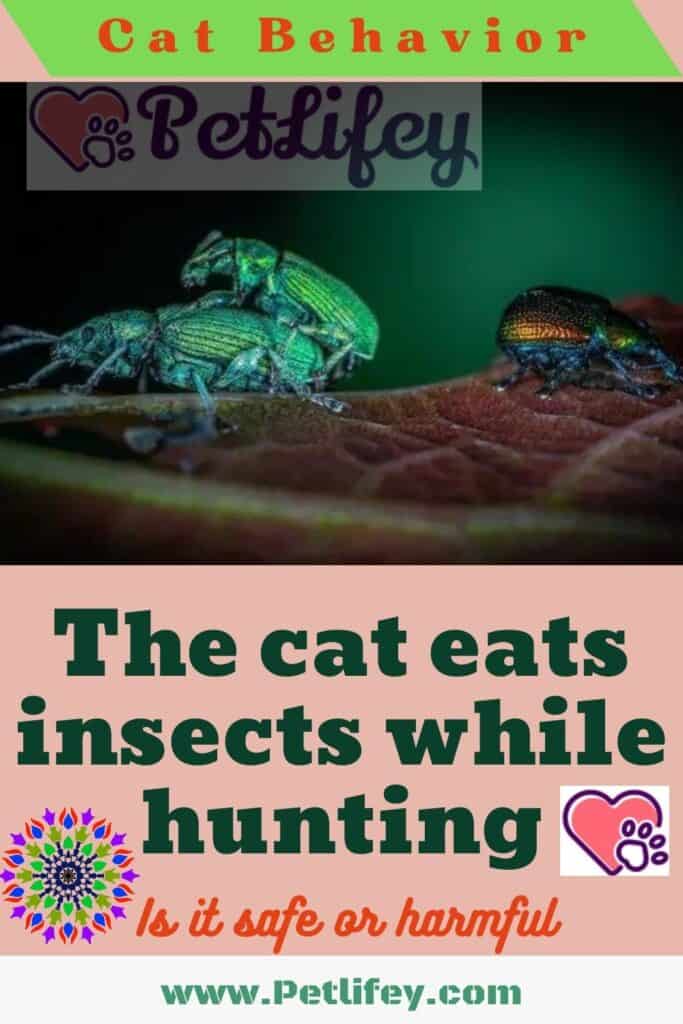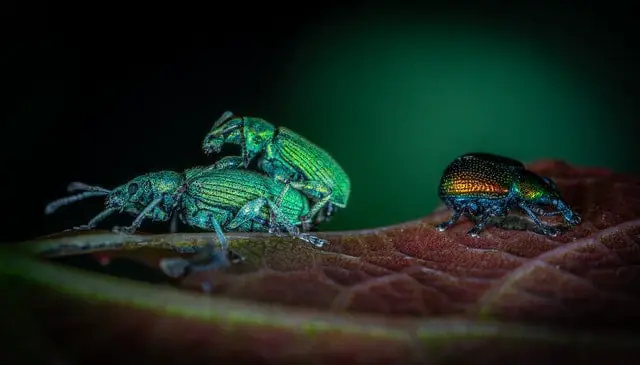
Cats are – as we know – hunters, and as such they also behave at home. But if the cat eats insects while playing with them or hunting them, is it bad for his health?
You don’t have to be a dog or cat enthusiast to know how different these two species are: the signs are all around us. While dogs are considered “man’s best friend” and have been domesticated, the social contract between cats and humans still has some gray areas. It is as if the cats have only partially accepted our offer of a meal and a bed to sleep in, and therefore are only half our friends. Sure, it’s easy to see photographs and artwork containing dogs as the image of domesticity, but feline images often seem to depict a wild predator lurking just below the surface.
The cat is still a hunter
In our modern world, we’ve really taken the cat out of the wild (or deserts, to be exact) wild, but haven’t quite managed to get the wild out of our cats. Whether our cat is always crouched in a corner, waiting to attack our feet as we pass, or is always carrying the spoils of a hunt on our carpets, even the cutest kitty has a wild heart inside.
Cats love to hunt; they love to chase, chase and capture. And having a constantly filled plate of food doesn’t seem to appease this primal desire in the least. For cats living indoors, where game is scarce, the most normal thing is to look for the easiest thing to associate with a prey: insects.
Why do cats chase insects?
Chasing insects is much more fun than a feather tied to a stick or a ball with a bell inside. These cat toys don’t talk to our kitty’s “inner panther” as a living creature does in a desperate attempt to preserve his life, so it’s no surprise that cats just love hunting insects. But can this practice be harmful to a cat’s health?
According to some veterinarians and behaviorists, in reality hunting often has little to do with hunger: a small number of insects would never be able to constitute a protein source suitable for the survival of a cat which, we always remember, is an obligate carnivore. The term obligate carnivore, or true carnivore, defines an animal that must eat animal protein sources to survive. Other mammals that are obligate carnivores exist both on land and in the sea, and include minks, tarsidae, dolphins, seals, sea lions, and walruses. Obligate carnivores among non-mammals include rainbow trout, salmon, hawks, eagles, crocodiles, and many snakes and amphibians.
Cats need a large amount of protein to survive, and they get the sugars they need mainly through gluconeogenesis, which uses proteins (rather than carbohydrates) to make glucose. Cats in the wild get their protein by chasing other animals such as mice, rats, birds, rabbits, and even the occasional reptile. And as long as we feed our cat the right amount of quality, low-carb, high-protein cat food, he should be able to get all the protein he needs.
Thus, this insect hunting phenomenon appears to have its basis in behavior and not in biology. Above all, it is believed that chasing and eating insects for cats is fun and instinctive at the same time, because the insects move very fast, and the cats’ brains are programmed to chase (a bit like what happens when they chase a laser). Because they are not as tame as dogs, the innate desire to hunt and prey while playing is still very active in domestic cats.
Can eating insects harm cats?
Internal insect parasites don’t have to be much of a concern, as the danger of ingesting insects is quite low. Some types of insects can carry parasites that can infect cats, such as Physaloptera or stomach worm, but these cases are few and usually far from each other. However, insects can also have an irritating effect on the gastrointestinal tract of cats, and vomiting and / or diarrhea are the common result. If the situation becomes serious or does not clear up on its own in a day or two, you should definitely make an appointment with your vet.
But some types of insects can certainly become a problem when they infest or live on a feline’s fur. For example, fleas can carry tapeworms or make cats anemic, and ticks, although technically not insects, can transmit various diseases to animals and people. In other words, the insect bite on the cat may be more concerning than if the cat eats insects. Bee stings and spider bites can also certainly cause an allergic reaction, either localized or anaphylactic, which often needs to be treated by a veterinarian.
Do pesticides make insects poisonous to cats?
We do our best to keep insects out of our home, and many of us turn to insecticides to combat these pesky critters when they venture inside. Since these poisons can be found on and inside insect bodies while they are still alive and being captured by cats, we should be concerned about the effect it might have if our cat eats poisoned insects. As it turns out though, luckily in most cases there is no need to worry .
Dying insects have such a low amount of toxin that it is very unlikely that it will have any side effects on our cat. However, the situation can be very different when a cat comes into direct contact with an insecticide. When we use any type of chemical at home, such as insecticides or other, a little research is always the best solution to avoid problems: in other words, we always read the label.
When using insecticides it is wise to make sure that these products do not contain pyrethroids, as these can cause severe tremors, high temperatures and seizures in some felines. This often happens in cases of ingestion of cockroach bait, which almost never cause side effects in cats, at most mild gastrointestinal signs. If we think that our kitty has ingested an insecticide, we must always contact the veterinarian in any case.
Do cats miss hunting?

Do our cats miss daily hunting as a game, and can insects serve as a simple substitute for this instinct? Or is it just kitten behavior that persists throughout our cats’ lives? Cats, according to experts, are probably simply using insects as hunting substitutes. Even though they seem to hunt very often, this activity remains just a game for them.
If we observe these furry hunters, often they do not even ingest the insect : they hunt it, hit it and maybe put it between their teeth, but often they do not swallow it. So while we’ll probably never know for sure, house cats seem to hunt to pass the time. Even though our cat’s insect hunt might be bad news for the bugs in our home, it all comes down to her instinct to be… a cat.






